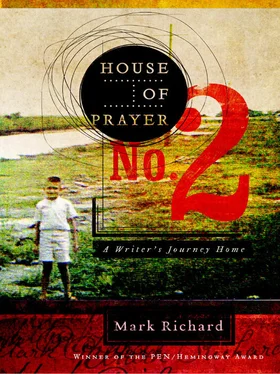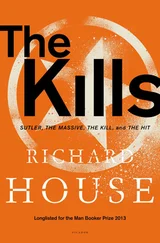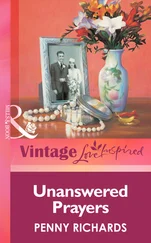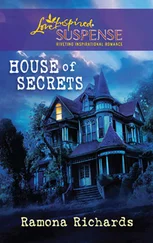At that time, in your state, rape is a capital offense; you go to the Big House in Richmond, where they strap you into the electric chair. The Commonwealth’s Attorney lives on your street, down three houses in the next block. The Preacher lives across the street with Janet and the boys. The Commonwealth’s Attorney presses for the death penalty for the rapist and the jury delivers it. On the day the rapist is executed, The Preacher goes across the street and knocks on the Commonwealth’s Attorney’s door. When the Commonwealth’s Attorney answers, The Preacher says, Well, I hope you’re proud of yourself . The Commonwealth’s Attorney says, Yes, justice was served .
In the years to come, the two men will barely speak.
In the years to come, you hear that the rapist had been extorting protection money from the poor blacks who lived in the neighborhoods behind you, neighborhoods from which the Commonwealth’s Attorney collected rents. Janet will say that on Saturday nights The Preacher would be sitting in bed going over the next day’s sermon, trying to ignore the singing and piano playing coming from the Commonwealth’s Attorney’s house across the street.
ONE MORNING YOU’RE SITTING at the dining room table and your mother stands in the kitchen doorway and says she has water boiling, what do you want for breakfast, soft-boiled eggs or oatmeal, and you croak, Oatmeal . Your voice has changed overnight. It happens, your doctor says later, sometimes with choirboys, boys from warm climates. Your mother almost drops her wooden spoon and runs to fetch your father, who comes into the dining room still holding the pair of square brushes he uses to get his crew cut to stand perfectly up.
Tell your father what you want for breakfast , your mother says, and you say Oatmeal again, this time even deeper. Your mother looks at you with her fearful Catholic-lapsed eyes as if your head might spin around and everything her mother has been telling her is true.
Augie, the radio station manager who lives across the street, tells your father that you could have a career in broadcast radio, and your father wants to know if you can start right away. Well, sure, says Augie, and pretty soon you are riding your bicycle down to the little radio station in the strip mall by the river on the edge of the black part of town.
The other announcers teach you how to pronounce the letter W . You pronounce it Double U . Then they have you read some news copy off the clattering UPI Teletype machine in the newsroom. They roll some tape, and you record your first commercial for Leggett’s department store, spring specials for men. When the announcer who has the four o’clock show quits, Augie asks you if you can get down to the station on your bike after school and fill in. You’ll have to get a work permit because you are underage. The juvenile judge is willing to sign the work permit for you even though your best friend’s dog bit his son. It has been noted that you are a surly boy and maybe this will straighten you out.
It is a small station located between a discount clothing store for black people on one side and a beauty parlor and a Laundromat on the other side. Across the dogleg parking lot is a discount drugstore and a supermarket, both patronized by black people. The secretary of the radio station tells you to bring your bicycle into the station in the afternoons, don’t leave it out on the sidewalk.
There are two large turntables covered with green felt that is replaced every time the town’s saloon keeper puts new green felt on his pool tables. Augie and the other salesmen ask the Lebanese saloon keeper if they can have the scraps. Augie has said on the air that the Lebanese saloon keeper is the only man in town more popular than Jesus Christ. Augie can say things like that, he is the voice of your town. When he introduces the black disc jockey who follows him in the mornings to do the R&B show, Augie says, And now, in living color, Wally Hale! After Wally Hale’s show, Augie comes back at noon to do the Farm Hour —crop prices, weather forecasts, and the state of crop subsidies, which your scoutmaster says are part of a larger Communist plot. After the Farm Hour a lady who chain-smokes plays country music until you arrive at four o’clock.
You play records from Augie’s rack and some from Wally’s, you read the news off the Teletype machine, do Billboard of the Air—mostly cakewalks, church dinner announcements, lost animals—read the final news, play the national anthem, and shut down the transmitter. You take out the trash, load the Teletype with paper, turn out the lights, lock the door, and then ride your bicycle home in the dark.
You make two dollars an hour.
Saturday mornings you no longer have to drag chain through the woods for your father, because you have the afternoon shift. If you need the whole day off to go camping with the Boy Scouts or participate in trash walks along the highway where once you found a fetus in a cider bottle, the other salesman with gouty feet can fill in, always happy to play the records from his days entertaining at the London USO Club during the war where he met his wife. His English wife doesn’t understand his thrifty enthusiasms—spray painting their family car canary yellow with a box of aerosol cans he got in a convoluted radio commercial deal with a hardware store that was going out of business. Sometimes he turns the studio monitors up so loud that the hair dryers in the beauty parlor next door vibrate, and they hate to call but they do.
On Sunday mornings you all take turns hosting the Gospel Show . One Sunday a month you get up at five in the morning, ride your bike over to the cemetery, make sure the three red lights are burning on the antennae so you can check off the maintenance log. For a while there was a grave that broadcast the station, something to do with the metal lining of the burial vault and the fillings in the teeth of a lady’s corpse, theorized the station engineer when some people from a television station came to investigate; then one day it stopped.
Then you ride through the sleeping town and open the station. You have to let the tube equipment warm up for a half hour and check the pile of Teletype that has been layering up all night. Vietnam. Patty Hearst. You used to have a crush on Jane Goodall but now you have a crush on Patty Hearst, the heiress who joined the Symbionese Liberation Army, after Jane Goodall never answered your letters. In your love letters to Jane Goodall you lied to her about the respect you had for what she was doing for all those monkeys. Secretly, you wanted to live with her in a tent with only books and a lantern among animals who walked comically worse than you do. On the transmitter, there is a series of flip levers and buttons to hold in for five seconds simultaneously and then release, knobs to turn just so to bring the station on the air, you’re always nervous you’ll get it wrong and blow up the transmitter. At 6:00 a.m. on the dot you pop in the cartridge with the national anthem played by the Air Force Academy orchestra. You’re live, you’re on the air, you’re thirteen, good morning.
You watch carloads of black men pull up in the empty parking lot outside the studio through the large plate-glass window. There’s the first preacher, a tight little man in a black suit, Bible under his arm. There’s the Mighty Clouds of Joy, the Gospel Harmoneers, is that the Blind Boys? Some of the players, the guitarists and bassists, the keyboard musicians, have come straight from shot houses and roadhouses out near Four Corners or Checkboard Square or South Quay, they smell of cigarettes and gin, some are still a little drunk in sweaty yellow or purple faded tuxedo shirts with sprung collars and missing cuff links. They set up their equipment in the tiny B studio and make a lot of noise you can hear in your headset while you’ve got the microphone open reading the Darden Oil Company news.
Читать дальше













